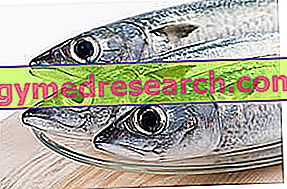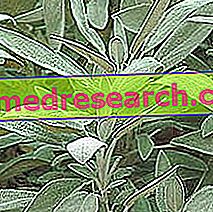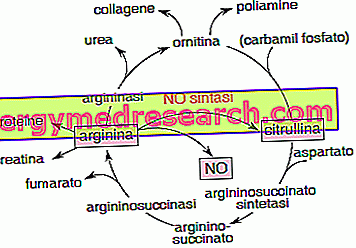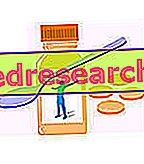Watch the video
X Watch the video on youtubeIs there a diet against hypothyroidism?
The fundamental role of iodine in promoting correct thyroid function, and the great spread of the disorder, make many people with hypothyroidism wonder if there is an effective diet to treat this condition.

Hypothyroidism and Iodine deficiency
Worldwide, severe iodine deficiencies are one of the most common causes of hypothyroidism; on the other hand, we must not forget that even an excessive intake of the mineral can - in the long run - subvert the normal thyroid function, by establishing pictures of hyper but also hypothyroidism.
Equally often, hypothyroidism has an autoimmune origin, because it is linked to alterations of the immune system (see Hashimoto's thyroiditis); more rarely, on the other hand, the thyroid does not work due to ineffective hypothalamic stimulation, or due to its congenital absence.
Iodine supplements: are they good?
From what has been said so far, although the use of supplements rich in iodine is particularly useful in cases of reduced dietary intake, when hypothyroidism does NOT have a dietary origin, it is advisable to avoid any specific supplementation, given that an excess of iodine could even precipitate the condition. In other cases, these products would be completely irrelevant, turning into a useless waste of money.
For this reason, when talking about diet and hypothyroidism it is necessary to avoid generalizing:
since the disorder recognizes various causes of origin, the response to oral iodine supplementation may be different.
Under medical supervision, this practice can be useful only in those cases in which hypothyroidism is supported by nutritional deficiencies, today rarer than in the past due to the widespread practice of adding iodine in common salt. The intake of the mineral can also be increased through the simple diet, simply by choosing foods rich in iodine, such as sea fish, seaweed, molluscs and integral sea salt.
However, specific supplementation offers the advantage of being standardized in doses, a goal that is very difficult to achieve with common nutrition.
Food iodine
There are also particular foods (such as cabbage, broccoli, cauliflower, soybeans, flaxseed, turnips, radishes, millet and tapioca) which - especially if eaten raw - greatly increase the need for iodine, disturbing its metabolism. These foods, called gozzigeni, should therefore be consumed in moderation, but only in the case of hypothyroidism due to iodine deficiency.
Tireostimolanti
Guggulsterones and forskolin are among the most used supplements to stimulate thyroid function in healthy subjects.
Unofficial medicine also recommends coconut oil, because it seems able to stimulate the functionality of the thyroid gland and support the metabolism.
However, all these products certainly cannot replace the efficacy of hormone replacement therapy for those suffering from hypothyroidism.
Importance of Selenium
For some years now, we know that in addition to iodine deficiency, other environmental factors, particularly selenium deficiency, can contribute to the onset of hypothyroidism.
While iodine is the fundamental element for the synthesis of thyroid hormones, triiodothyronine (T3) and thyroxine (T4), selenium plays a fundamental role in their metabolism.
Cereals, meat and fish are important sources of selenium.
Diet and Thyroid - Video
X Problems with video playback? Reload from YouTube Go to Video Page Go to Wellness Destination Watch the video on youtubeDiet and Pharmacological Interactions
The fact that the official medicine gives little importance to the diet in the treatment of hypothyroidism, also derives from the fact that this disorder can be easily controlled through a replacement therapy based on levothyroxine, possibly accompanied by triodothyronine. In practice, the thyroid hormones, which are deficient in all cases of hypothyroidism, are taken with a simple tablet of medicine.
Effective, safe and in therapy for many years, levothyroxine must be taken according to medical indications; generally, it is recommended to take it on an empty stomach, at least 4-5 hours after taking iron or calcium supplements, as well as the multivitamins that contain them. The same applies to antacids based on aluminum or magnesium salts, and to foods such as soy flour, nuts, and various drugs (cholestyramine, colestipol, sucralfate).
Generally, even excess fiber can reduce the intestinal absorption of synthetic thyroid hormones; however, the foods that are rich in them are very important to avoid constipation problems, quite common in people suffering from hypothyroidism. Fruit and vegetables, therefore, should be consumed at a sufficient distance from taking the medicine, without depriving themselves in any way of their precious nutritional contribution.
The role of diet in the treatment of hypothyroidism is therefore directed, at least according to official medicine, above all to avoid possible interactions with the medicines taken; in this sense, we refer to a careful reading of the illustrative leaflet and to medical advice, dissuading readers from the idea of unconsciously modifying their diet on the basis of what they have learned on the internet, especially in sites that - unlike this - prefer to embrace the theses of unofficial medicine.



